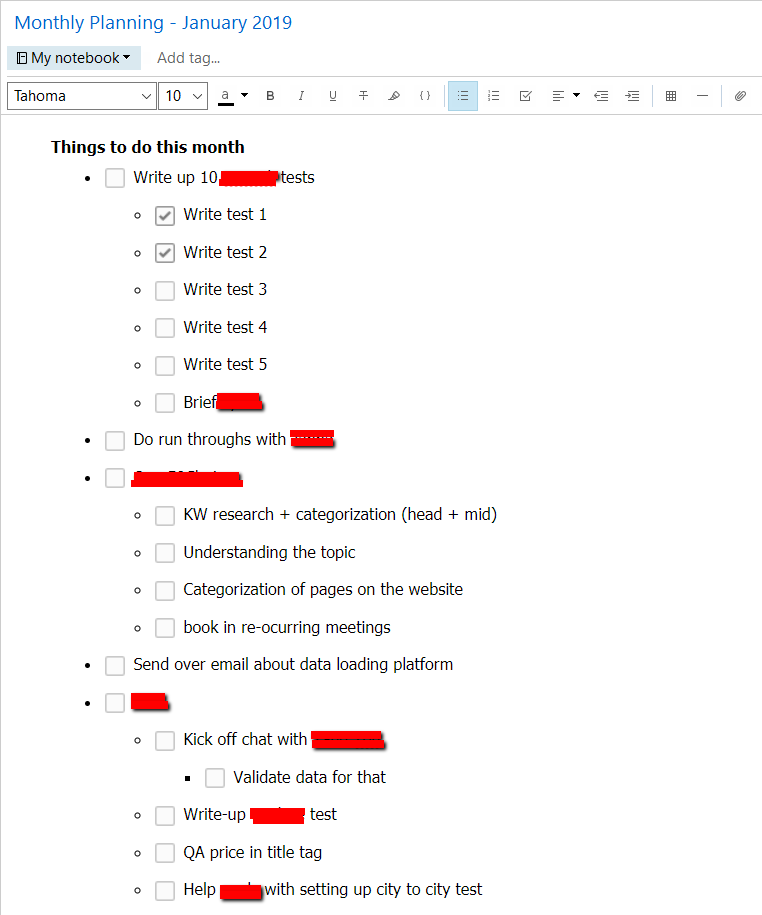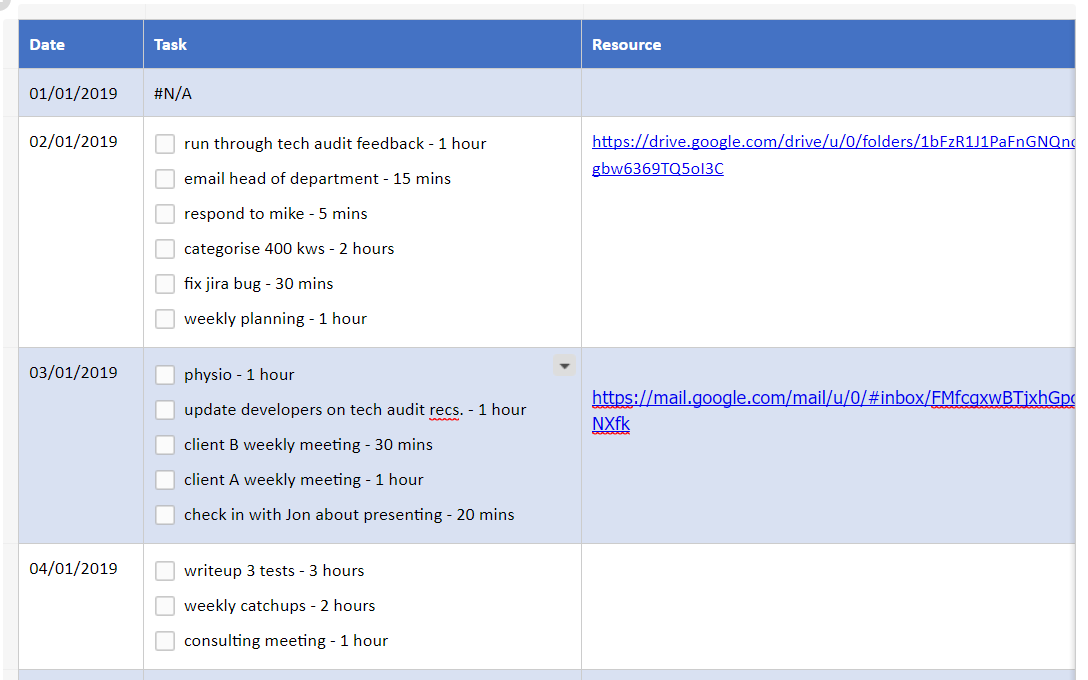How to get better at account management
At this point I've now been managing accounts and clients for almost 4 years. I am no longer totally awful at it.
It's a lot easier to value hard skills so they tend to get taught more, but the soft are just as useful. This post is about the soft.
Here are all the things I wish I'd been told when I started. (I might being uncharitable here, perhaps I was told them and didn't pay attention.)
I've tried to organise this post relatively sensibly. Jump to what you think might be your problem or just go crazy and read the whole thing.
How to plan an account
Do I need a monthly plan?
Yes.

What if I don't know enough about the project to plan? See how do I delegate.
As with all plans, the most important thing is having one and keeping it up to date.
Make your plan as simple as possible and see how attentive you are to keeping it up to date. The more attentive you are, the more fancy features (bells, whistles, cherries on top) you can add in.
Up-to-date > fancy
My initial plan needed too much upkeep and I didn't keep it up to date. Might as well not have one.
Do I need a 6 month plan?
It's definitely worth trying for, but it's going to be pretty wishy washy and that's totally ok.
Having a long term plan is hard. Things overrun, the person you're working for changes, new projects appear, markets change, the CEO googles randomly, GDPR "suddenly" happens.
Most of your clients will end up with wildly fluctuating plans despite their assurances that this totally won't happen.
Have a plan, but the closer you get to 6 months, the less detail you'll need. If you can't get past 3 -4 months, that's fine.
Here's an example account plan
An example plan. At the bare minimum you could just put the plan below in your note taking software of choice and that would be fine.
Up-to-date > fancy. Can't really say that enough (although I will try).
(Incidentally this is a hypothetical example plan. You will actually need to make your own.)
- Total hours per month - 40
-
Month 1
-
Head term keyword research - 15 hours
- Topic A - 3 hours
- Topic B - 3 hours
- Topic C - 4 hours
- Clean-up of data - 3 hours
- Doesn't include mapping to pages
-
Basic technical SEO audit - 19 hours
- Basic audit checks - 11 hours
- JS rendering issues (context from call) - 3 hours
- Writeup - 4 hours
- Ad-hoc questions - 3 hours
- Meetings - 3 hours
-
-
Month 2
- Mid & Long tail keyword research - 13 hours
- Mapping keywords to pages - 16 hours
- Developer communications following tech audit - 3 hours
- Ad-hoc questions - 5 hours
- Meetings - 3 hours
-
Month 3
- Run-over - 15 hours - At this point it's very plausible extra work will have come out of those first sets of work
- Featured snippet audit on primary landing pages - 12 hours (based off keyword research)
- Backlink audit (Part 1) - 6 hours
- Ad-hoc questions - 5 hours
- Meetings - 3 hours
-
Month 4
- Possible migration work begins. If not content analysis. - 20 hours
- Backlink audit (Part 2) - 13 hours
- Ad-hoc questions - 5 hours
- Meetings - 3 hours
Here's an example Google Sheet template for account planning
If you'd like something with slightly more detail, here's the template I use for all my clients.
Using a Google sheet lets me easily create an internal and external version of my plan that are sync'd together.
I suck at estimating how long work will take
Don't we all.
In my experience it's usually some combination of:
- It's quite rare to do the same work with the same scope twice. You might do two content audits, but the scope and size and context might be totally different.
- You've literally not done it before.
- Different people will take different amounts of time.
- Coordinating with other people has natural delays (aren't other people the worst?).
How can you get better at this?
- Do more of it. Experience really does help here.
- Track your time per task. This is hard habit to get into it, but it is valuable.
- Remember a write-up can often take at least a day, probably longer with revisions.
- Be honest with yourself. For a certain type of person (of which I am one) a lot of these problems come from wild optimism that can be tamed by spending slightly more than 20 seconds to think about it.
You can also do a lot of reduce the impact of it:
- Reduce the scope of tasks in months when you're super busy. Most people are happy to hear you can do their work faster, but un-happy to hear you'll be slower.
- Stop and re-estimate the time as you're progressing through the task. As soon as you think you're going over start re-planning.
- Bonus tip from @JamesGurd, which I enjoyed. He gets his clients to sign-off on a contingency of around 10% to his projects to help cover the un-expected (only used if needed). Any explicit acknowledgement that things can change (which we all silently pretend won't happen), is almost certainly a good thing.
My client keeps asking for work that isn't planned
Totally fine. Perhaps even... good.
As we mentioned above, plans change, this should be expected.
The response you should give them is almost always the same. Provide them two options:
- Suggest to them what can be bumped to fit it in.
- Tell them how much it will cost in addition to do it this month.
Either you'll get more budget, or you'll have to re-plan. Either is fine.
I've run out of work to plan
This problem sounds absurd, but it does happen.
Your client is paying you £x,xxx per month, it's valuable consistent money in the bank.
What do you do, when you run out of ideas and things to do for that money? How does this even happen?
Typically it happens because there are constraints on the account which stop you from running at full effectiveness. e.g.:
- Your client might be unable to make changes in certain areas and don't want to them investigated until they can.
- They might have endless agencies for every specialisation.
- You might just not have enough experience to know what to do.
Whatever these constraints are they can prevent you from doing the work you'd like to do. This is rarely a long term state, but you can sometimes find yourself needing to be valuable when your hands are tied.
There are a couple themes I've often found it worth looking at when this happens:
- Expand to new areas - If your client doesn't have agencies for every little specialisation this is a great idea. Otherwise we move on.
- Find out your channel/industries "endless" tasks - In SEO for example is often content production (in some facet). You can do a tech audit, let's charitably say once a quarter, but you can make content every month and have it be valuable. Find your equivalent and do that.
- Competitor research - Businesses rarely compete with themselves, they're usually obsessively and constantly watching competitors. There is often work around this.
- Schedule in anything that needs repeating - There are tasks (like a tech audit), that aren't done super regularly, but will come up more than once. Schedule them in and once your plan has re-shuffled to accommodate them you may suddenly be more busy.
How to plan your work
Do I need a personal plan?
Yes. Without a plan you'll get stressed, your brain will feel full and overwhelmed, you'll find random thoughts about your account leaping into your brain, you'll struggle to finish things off, you'll have a bad time and die young...

Did you see the bit about the stress?
When you're juggling multiple accounts you're going to need a plan. Doesn't matter what your personal system for planning work is, what's most important is you find something that works for you.
What kind of plan should you have?
I'd recommend having two kinds of personal plan:
-
A top level monthly plan.
- A list all the things you need to get done in the month. When I think of anything I need to do, it goes on this list. This is usually quite top level e.g.: Make a strategy for example.com.
-
A day to day plan
- Here you list what you're going to do each day. This is far more granular e.g. Build the initial keyword list for example.com.
- Everything from the first list eventually gets moved onto here.
I would also suggest your plan should be:
- Low investment.
- Easy to carry around with you.
- Not your inbox.
Finally and crucially:
How to you use your plan:
- Anything that takes longer than 3 minutes goes onto one of your plans. If it takes less than 3 minutes do it immediately.
Here's is one possible set-up
I like to use Evernote for my personal plan. It:
- Syncs across all my devices.
- Has checkboxes so I can have the satisfaction of ticking them.
- Maintains all my old plans.
- Is super quick to load.
I create a new note each month called: Monthly planning - {month} {year}, which contains both the top level month plan and my daily plan.
Here are some screenshots from my example evernote month plan (both from the same note). First the top level plan:

Then below that I put the daily plan:

How to delegate work
Do I need to delegate?
Yes. Otherwise you will go mad. There are a couple common reasons why people don't delegate. (See below.)
You're going to need to get over them because if you can't delegate, you can't scale past yourself.
My co-workers can't do my work, they don't have the experience.
Maybe you've had a couple bad experiences with handing out work, maybe things came back late or the quality wasn't high enough?
Perhaps you spent so long going through the other persons work you might've just done it yourself. Fuck this you thought, I'm gonna do it myself next time, it'll be so much quicker and easier, and better and have cherries on top too.
Yes it probably will be quicker the first time, but you'll end up with a teammate whose never learns and never takes anything off your plate.
That's a teammate not worth having and it's in large part your fault. Delegate. (See How do I delegate.)
My co-workers can't do my work, they're bad at their jobs.
It can be very hard to separate out bad delegation from someone being genuinely bad at their job.
The best advice I can give here is to talk to other people you respect (probably someone more senior) to get some perspective on the issue.
This is far too nuanced and personal for to be able to solve in a blog post, but remember that after you've got a decent amount of experience it can be hard to put yourself back in the shoes of someone less experienced.
I got bad work and now I have to fix it all myself.
Eugh. You followed this advice, delegated and the work came back in poor quality. Now deadlines are looming and you're going to have to fix the blasted thing. Damn you Dom and your shoddy advice.
This obviously isn't ideal but most of the time with some planning we can avoid the worst of it.
Nearly always we want to:
- Give it back to them with copious notes and have them fix it.
If you fix, they won't learn and will have less of a chance of learning the standards you and your business have.
How can we make that happen?
- First off we can delegate well in the first place: See how do I delegate.
-
Secondly we can often bump the deadline to get time:
- Is the deadline for this piece self imposed? Do you actually have more wriggle room than you thought?
- How is the relationship with the client, as long as a client isn't getting charged more for the work (i.e. you won't bill extra or the work won't slip a month) often you can push back and get more time. Assure them you want to get them the best possible work, the task is slightly more complicated than planned (which is often the case) and most people are reasonable. If it was super important for your client you will often have been informed beforehand.
- Are there other pieces of work for this client or a different one which could be pushed back and re-organised to give yourself more time for this task?
How should you delegate?
If you're delegating to someone very junior then the following is a useful checklist:
- Plan for it to take just as long as if you did it yourself.
- Leave at least a week at the end for when it goes wrong and needs iteration.
- Write a brief and ask the person doing it to re-read the brief a week in, when they've had time to process the task. (Will prevent them from missing things.)
- Set expectations (see setting expectations).
- Have a quick 15/30 minute feedback session at the end of the task.
-
Have the person being delegated to check in at 5%, 40% and 90% (percentages are more guidelines).
- 5% - Are they planning on doing the right thing?
- 40% - In practice did they do the right thing?
- 90% - Loose ends & formatting.
- If you don't know how to do the task, have someone else assist them on managing the task i.e. (helping them plan it, read it through etc.)
As the people you delegate to get more senior you'll hopefully end up doing a lot less of that list.
How to manage your headspace
I'm stressed because I have so much to do from all these accounts.
Having accounts is stressful. While you might not be responsible for all the work you are accountable for that account and that's stressful.
Even worse, it's not just you controlling everything, there are lots of things that rely on other people. See do I need to delegate.
You have all these things buzzing around inside your head, it makes you feel overwhelmed and like you can't relax.
You've run out of "headspace".
Typically you need to do one of two things: lower the number of accounts you have or write more things down (see having a personal plan).
How many accounts should you have?
Your experience may vary. What we've found at Distilled (where I currently work), is having more than 4 full time accounts is a drain. Doesn't matter the budget of these accounts (budget is not as correlated with headspace as you would like to think), past 4 it can often be difficult.
One thing that probably does affect this is the type of work you do. Our work is all very custom and that takes up more headspace.
If you have a super rote process that you apply to everything, every time then that will probably free up some headspace, but I haven't seen much of that, so can't comment.
How to set & manage expectations
Do I need to set expectations?
Yes. You're getting the pattern now. I've put most of these things in the guide because they're yes.
It's a long slow process to change someone's expectation. Changing it is often an uncomfortable conversation.
Save yourself that trouble by doing a decent job setting it upfront.
What kind of expectations should you be aware of?
There are often un-spoken questions when you begin a working relationship, then more will appear as time goes on. Here are some to be aware of.
Expectations of communication
- What level of check-in would you like?
- What kind of communication do they prefer, are they a details person? Are they technical?
- When are both of you available for ad-hoc questions?
- What medium do both of you prefer for ad-hoc questions?
- How long will you take to respond to ad-hoc questions?
- If either of you can't get hold of each other, who is good to get hold of?
- Do you prefer details in a meeting or over email?
Expectations of a specific project/piece of work
- What does success look like for this project?
- Are there any explicit goals?
- Who is the output of this project for and what should the format of the output be?
- How many different people are involved in this project?
How should you set expectations?
Make those often un-talked about questions explicit. I will typically try to do this as early as possible (so either at the beginning of account or project).
I'll state a preference (at least for communication questions) and then ask them what they prefer.
If they don't have one, they can just go along with it and if they do then you can hash out the details.
It is also usually a good thing to revisit these questions after a couple months if they didn't have strong preferences to make sure they're still happy. (Some people will tell you, others will just silently resent you for it.)
How can you change expectations?
Shoot it's all gone wrong. We've ended up with an account and the expectations are all wrong. Un-happy people, constant emails at absurd hours, goals that can't possibly be hit.
How do we change them?
Well there's a decent chance it's going to be an awkward conversation. As time goes on you get better at those, but when you're getting started the following tips might help:
1. Find a natural change point
It's always good to have a natural way to start the conversation and set the context you'll be talking about how you work together. Some common ones:
- An account review - Go through the status of the account and how you can better work together.
- A new project - Revisit the last project and go through the learnings.
2. Have a "bad guy"
A senior person at your company, a family member or a lifestyle change, whatever it is,this can be your reason for re-visiting the status quo.
3. Take the human angle
It's easy to be cold and impersonal to a company. It's a lot harder to do it to a person.
And depending on the expectation you're trying to set you can often talk about the human reason for why you're doing it.
E.g. If I'm trying to set expectations around when I'll respond, I'll probably talk about how I work best. I'm really scatterbrained, reddit accidentally slips open at the drop of a hat. I do my best to lock down all distractions and schedule in things like email otherwise I'd never get anything done.
How to get things done
Of all the questions here, this one is possibly the hardest to get a handle on.
There are so many reasons things don't get done. So very many reasons.
You could write multiple blog posts just on this topic and this is already quite long. In attempt for succinctness (perhaps late you might now argue), I'm going to resort to a quick list to touch on a common one, but this is probably one for another post.
Some reasons why things aren't getting done
- No budget.
- Lots of cross team ownership and endless permission gathering.
- Your point of contact doesn't have the authority.
- Bad KPIs cause people to act on the wrong things.
- Bad KPIs mean people aren't motivated to make changes.
- People protecting their jobs.
- Slow development.
- Your tasks aren't high enough priority.
- The team
Some things that can help
- Going to see people in person.
- Getting people who speak the same "language" together (e.g. technical person + developers)
- Keeping a record of what isn't getting done to show to people.
- Shortening documents.
- Having the technical skills to make changes yourself.
Conclusions
Well that was a bit of a monster. If you're new to this, hopefully this gives you some useful points to focus on. It's not a replacement for a good manager or mentor, sometimes these things are hard to spot in ourselves.
I'll probably add to this post or possibly split it up as time goes on and I continue to learn.
If you're new, lmk if this was helpful. If you've got the years under a belt then hit me up with what else I've missed. I'm sure there are many things.